Don't Make These Common Mistakes When Applying for a Mortgage

Don't Make These Common Mistakes When Applying for a Mortgage
Applying for a mortgage can feel like stepping into unknown territory, especially if it's your first time. With so much on the line, even small missteps can lead to big headaches—or worse, losing out on your dream home. Don't panic; with a little planning and information, you can steer clear of the most typical errors and streamline the procedure.
Let's examine some common mistakes people make when applying for a mortgage and learn how to avoid them.
1. Not Checking Your Credit Score Early
Your credit score greatly influences the type of interest rate you receive and your eligibility for a mortgage. One common mistake is waiting until you're ready to apply before checking your credit score.
If your score isn't where it needs to be, you could end up with higher rates—or worse, denied altogether. Months before you apply, check your credit score and take action to raise it by settling debt and fixing any mistakes on your credit report.
2. Skipping Pre-Approval
Shopping for a home without a mortgage pre-approval is like trying to shop without knowing your budget. Many people skip this step, only to find out later that they can't afford the house they've fallen in love with.
Pre-approval reduces the stress of the home-buying process by giving you a clear picture of how much you can borrow. It also shows sellers you're serious, which can be a big plus in competitive markets.
3. Making Big Purchases Before Closing
Once you've been approved for a mortgage, it's tempting to start buying furniture or a new car for your soon-to-be home. However, these big purchases can alter your debt-to-income ratio, which lenders closely monitor until closing.
Hold off on major expenses until after the deal is finalized to avoid jeopardizing your loan. Stick to your budget and avoid opening new credit lines, no matter how tempting those holiday sales might be.
4. Not Comparing Loan Offers
Many people go with the first lender they find, but not all mortgage offers are created equal. Lenders might differ greatly regarding interest rates, fees, and periods.
Take the time to shop around and compare at least three to five offers. A slight variation in interest rates can result in thousands of dollars in savings over the course of your loan.
5. Ignoring Additional Costs
It's easy to focus solely on your monthly mortgage payment, but don't forget other costs like property taxes, homeowners insurance, and closing fees. These can easily mount up and affect your entire spending plan.
When planning, use a mortgage calculator to get a realistic picture of your monthly expenses and make sure they fit comfortably within your budget.
If you avoid these common mistakes, applying for a mortgage doesn't have to be overwhelming. Get pre-approved, compare deals, and check your credit score first. Be mindful of your spending, account for all costs, and don't shy away from asking questions. With careful planning, you'll be one step closer to achieving your goal of becoming a homeowner!
Recent Posts
Disclosure:
The content provided within this website is presented for information purposes only. This is not a commitment to lend or extend credit. Information and/or dates are subject to change without notice. All loans are subject to credit approval. Other restrictions may apply. Mortgage loans may be arranged through third party providers.




